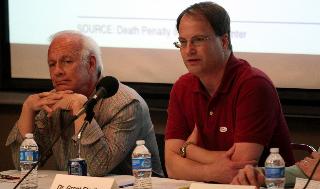Panelists give ‘fair-handed’ look at capital punishment
A political science professor, a minister, a philosophy professor and a lawyer gathered in Lumpkin Hall to discuss the controversial issue of capital punishment after Gov. Pat Quinn signed legislation March 9 abolishing the death penalty in Illinois.
More than 100 Eastern students and faculty members came to not only have their questions answered, but also hear four different sides to a highly debated issue. Karen Swenson, a political science professor, looked at the issue from a constitutional point of view.
Swenson said two amendments focus on the death penalty issue; the 8th and 14th amendments. The 8th Amendment states excessive bail shall not be required, nor excessive fines imposed, nor cruel and unusual punishment inflicted. Also the 14th Amendment forbids states from denying any person “life, liberty or property, without due process of law.”
“The Supreme Court has never taken the viewpoint that capital punishment is, in and of itself cruel and unusual punishment,” Swenson said. “There have been four justices over the years that individually have taken that view but never the court majority.”
Swenson said the court polices the issue by sorting through fairness procedures; holding themselves to a standard and proportionality reviews.
“They want to make sure that the punishment fits the crime,” Swenson said.
She also said Courts hold the taking of another person’s life is the only crime that justifies the death penalty.
Roy Lanham, the director of the Newman Catholic Center, took a religious view of the issue. Lanham discussed a sanctity and quality of life view rather than “an eye for an eye.”
“The State does have the right in the name of the divine authority and as an exercise of its duty to protect the common good. The arguments for the death penalty or capital punishment are grounded in the right and duty of the state to protect its citizens from unjust aggression.” Lanham said. “The question though is can this be done by prison sentence or other punitive means short of execution.”
Lanham discussed the goals of capital punishment whether they are retribution and vengeance or rehabilitation and deterrence.
“The death penalty prevents further acts of crime by the particular criminal but not much evidence, (the death penalty) deters others,” Lanham said.
Lanham said Illinois already has life in prison with no option for parole already instated that covers a major penalty for the criminal and public safety.
Grant Sterling, a philosophy professor, discussed how capital punishment can be justified on reasonable grounds.
Sterling said if someone decides to take away the liberties and freedoms of another, you have ultimately forfeited your freedoms and liberties.
“Capital punishment is not only morally acceptable, it is indeed morally required in some cases,” Sterling said. “It requires that the state construct a reasonable and consistent method of executing the most heinous criminals.”
Sterling said the state has an obligation not to abolish the death penalty, but rather reform the system to correct its injustices.
Lastly, Steve Davis, a lawyer from the Student Legal Service, defended the side of rehabilitation while also agreeing with Lanham on the sanctity and quality of a human life.
“I have come to a fairly simple solution,” Davis said. “I don’t use my head, I use my heart. My heart does not permit me to take another life.”
Davis said a person’s mind can rationalize anything, but the mind is not the proper place for matters of death. Davis also said prisons are turning into “storage facilities for wasting flesh.”
“The only thing I don’t like about life imprisonment we don’t do hardly anything for rehabilitation we just got cages we put people in. These people are broken and many of them I think are redeemable,” Davis said.
After each panelist had presented their opinion the audience had the chance to ask their own questions about the death penalty. Questions ranged from how the desire for revenge effects courts rulings to how other states rationalize keeping the death penalty.
Andrew Moran, a junior philosophy major and president of the Philosophy Club, said it took about six to eight weeks for the philosophy club to contact the panelists Eastern had to offer. He said the club was responsible for constructing the historical presentation for the forum.
“We are really satisfied with the turnout, I think people learned a lot,” Moran said. “We put in a good amount of effort but it was sent back to us ten fold. It was great to see so many students here and that the Philosophy Club can get out and start encouraging philosophical discussion and encouraging people to start thinking about these really important issues. I think today really did that.”
Ethan Ingram, a junior mathematics major, was very impressed by the opinions that were presented.
“I think it had a very fair-handed look at the issue and I’m glad that we were able to have this discourse responsibly and fairly without heavy bias on either side.” Ingram said.
Grant Anderson can be reached at 581-2812 or ghanderson@eiu.edu.
Panelists give ‘fair-handed’ look at capital punishment

Steve Davis, a lawyer from the student legal service, and Grant Sterling, philosophy professor, speak about capital punishment during a debate Tuesday evening in Lumpkin Auditorium. Karen Swenson, a political science professor, and Roy Lanham, minister





































































